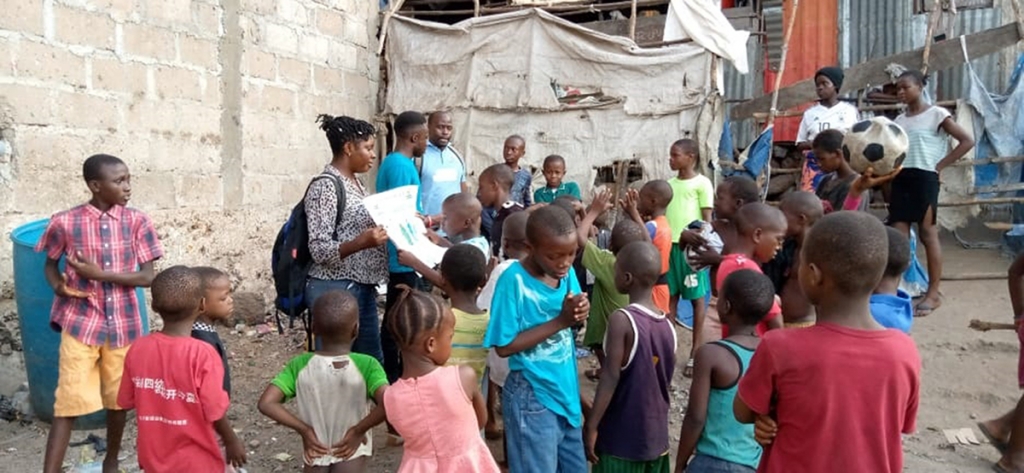GLOBAL: Coordinated Salesian response to coronavirus pandemic positively impacts youth around the globe

(MissionNewswire) As the coronavirus pandemic has impacted countries worldwide, Salesians have been mobilizing much in the way they have when faced with other humanitarian and health crises. Living in the communities in which they work, the Salesians are well-positioned to respond to the needs of people in their programs, and in some cases the broader communities, while sharing information and practices with other Salesian centers around the globe.
The General Council of the Congregation has initiated a coordinated emergency response. In addition to sharing information and best practices, the emergency response has included several actions. These include mapping people who Salesian centers can reach, identifying what they need, and evaluating the resources available to meet those needs.
Salesian organizations are also sharing best practices, carrying out advocacy work through the Salesian presence at the United Nations, and developing fundraising campaigns in a coordinated manner. The General Council of the Congregation is also monitoring the distribution of resources both bilaterally and internationally.
“It is important to have this coordination because the issue we are facing is a worldwide one, affecting 209 countries and territories, and Don Bosco centers are active in 134 of them,” said Father George Menamparampil, General Council of the Congregation emergency response coordinator. “There is a lot we can learn from each other. We share best practices. We share information about what each province and institution is doing. We communicate our successes and failures. We speak about our needs and share our resources. No one has in excess, but the coordination helps to ensure that what we have go to the weakest, the neediest and the most vulnerable.”
Fr. Menamparampil added, “The impact so far has been more than we expected. The coordination and the exchange of information have shown that there are a lot of needs that governments and the official structures are unable to meet. There is a lot that a worldwide network of so many (15,000) can do to alleviate the suffering of the poor. That awareness has been the biggest impact in the initial week or 10 days of this coordination. The amount we have learned from each other, the courage, daring and dynamism that has suddenly exploded in all parts of the congregation, has been the second big impact. The actual benefit for the poor at the grassroots level is now growing very fast all over the world.”
Salesians have been organizing to respond as best they can to the needs of the poor and most at-risk populations like migrants, daily wage earners, the homeless, sick and elderly. While Salesian communities have had to suspend normal activities, closing courtyards, playgrounds, churches, and classrooms, they are still actively responding to the needs of poor youth and those in desperate situations in their communities, particularly with prevention measures and nutritional support.
Salesians have also been creating and distributing educational and awareness materials, along with soap, sanitizers and masks. They have been holding online religious services and using their own online radio stations in countries like Nigeria and Ghana to engage youth and put out awareness information. Salesians are also supporting their communities. In Kerala, India, the government is converting the Salesian college and its hostels into an isolation hospital to treat patients.
“What is clear is that this pandemic is worsening the living conditions of already poor people. They are caught between uncertainty and fear,” said Father Jacob, a Salesian missionary in Sudan* who is working within a camp for those who have been internally displaced. The camp is in a precarious situation because of crowding and limited access to health services.
Last year, Salesian missionaries in Goma, the Democratic Republic of the Congo*, were concerned about the spread of Ebola in the city and were preparing facilities and programs in anticipation of children returning to school. This year, they are facing the COVID-19 pandemic and are pulling their resources together to help the youth in their programs. Father Domingo reported, “We have 40 children with us who have no family and about 80 orphans.”
In Angola, the response is the same. Salesian Brother Maximo said, “The biggest concern in Angola is the care of street children. The government has asked us to welcome another 100 street children. Currently, we already take care of almost 300 in different centers.”
In countries around the globe, Salesians are continuing to assess the needs of youth in their programs and work to innovate—creating masks for their programs and local health services, cooking and distributing food, and launching awareness programs to help bring prevention information to youth in their programs and the community at large.
###
Sources:
ANS Photo (usage permissions and guidelines must be requested from ANS)
*Any goods, services, or funds provided by Salesian Missions to programs located in these countries were administered in compliance with applicable laws and regulations, including sanctions administered by the U.S. Department of Treasury’s Office of Foreign Asset Control.




